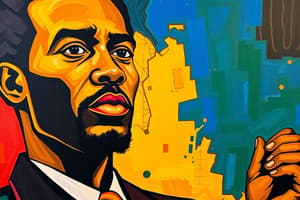Podcast
Questions and Answers
When did Pan-Africanism emerge?
When did Pan-Africanism emerge?
- 18th century (correct)
- 19th century
- 17th century
- 20th century
Which organization did Marcus Garvey found in 1914?
Which organization did Marcus Garvey found in 1914?
- African Union
- Universal Negro Improvement Association (correct)
- NAACP
- Pan-African Congress
What is a core principle of Pan-Africanism?
What is a core principle of Pan-Africanism?
- Colonial expansion
- Economic dependency
- Self-determination for African nations (correct)
- Cultural assimilation
Which Pan-African event took place in 1945?
Which Pan-African event took place in 1945?
Who was the first president of Ghana and a key figure in African independence movements?
Who was the first president of Ghana and a key figure in African independence movements?
Which influential figure was a Jamaican activist and key figure in the Harlem Renaissance?
Which influential figure was a Jamaican activist and key figure in the Harlem Renaissance?
What was one of the impacts of Pan-Africanism?
What was one of the impacts of Pan-Africanism?
What is NOT a core principle of Pan-Africanism?
What is NOT a core principle of Pan-Africanism?
Flashcards are hidden until you start studying
Study Notes
Definition and Origins
- Pan-Africanism is a movement that aims to unite and empower people of African descent worldwide
- Emerged in the 18th century, influenced by the transatlantic slave trade, colonialism, and racism
- Key figures: Marcus Garvey, W.E.B. Du Bois, and Kwame Nkrumah
Core Principles
- Unity and solidarity among people of African descent
- Self-determination and independence for African nations
- Economic empowerment and self-sufficiency
- Cultural preservation and promotion of African heritage
- Anti-colonialism and anti-racism
Key Events and Movements
- Pan-African Conference (1900): First international meeting of Africans and people of African descent
- Universal Negro Improvement Association (UNIA, 1914): Founded by Marcus Garvey, aimed to promote black nationalism and unity
- Fifth Pan-African Congress (1945): Attended by prominent figures, including Kwame Nkrumah and W.E.B. Du Bois
- African independence movements (1950s-1960s): Nationalist movements across Africa, leading to independence from colonial powers
Influential Figures
- Marcus Garvey: Jamaican activist, founder of UNIA, and key figure in the Harlem Renaissance
- W.E.B. Du Bois: American sociologist, historian, and civil rights activist, co-founder of the NAACP
- Kwame Nkrumah: Ghanaian nationalist, first president of Ghana, and key figure in African independence movements
- Julius Nyerere: Tanzanian politician, philosopher, and anti-colonial leader
Legacy and Impact
- Inspired African independence movements and national liberation
- Influenced the Civil Rights Movement in the United States
- Fostered a sense of global African identity and solidarity
- Shaped contemporary African diasporic culture and identity
Definition and Origins
- Pan-Africanism is a global movement that seeks to unite and empower people of African descent, promoting their rights, dignity, and self-determination
- Emerged in the 18th century as a response to the transatlantic slave trade, colonialism, and racism
- Key figures who shaped the movement include Marcus Garvey, W.E.B.Du Bois, and Kwame Nkrumah
Core Principles
- Unity and solidarity among people of African descent, promoting a sense of shared identity and destiny
- Self-determination and independence for African nations, rejecting colonialism and foreign domination
- Economic empowerment and self-sufficiency, through development of African economies and resources
- Cultural preservation and promotion of African heritage, including languages, traditions, and customs
- Anti-colonialism and anti-racism, challenging systems of oppression and discrimination
Key Events and Movements
- The 1900 Pan-African Conference was the first international meeting of Africans and people of African descent, marking the beginning of the modern Pan-African movement
- The Universal Negro Improvement Association (UNIA), founded by Marcus Garvey in 1914, promoted black nationalism and unity, with a focus on economic empowerment and self-reliance
- The 1945 Fifth Pan-African Congress was a pivotal meeting that brought together prominent figures, including Kwame Nkrumah and W.E.B.Du Bois, to discuss African independence and self-determination
- The African independence movements of the 1950s-1960s, led by nationalist figures, resulted in the independence of many African countries from colonial powers
Influential Figures
- Marcus Garvey was a Jamaican activist who founded the UNIA, promoting black nationalism and unity, and played a key role in the Harlem Renaissance
- W.E.B.Du Bois was an American sociologist, historian, and civil rights activist, co-founder of the NAACP, and a leading figure in the Pan-African movement
- Kwame Nkrumah was a Ghanaian nationalist, first president of Ghana, and key figure in African independence movements, who played a crucial role in the decolonization of Africa
- Julius Nyerere was a Tanzanian politician, philosopher, and anti-colonial leader, who advocated for African socialism and self-reliance
Legacy and Impact
- Pan-Africanism inspired African independence movements and national liberation, leading to the decolonization of Africa
- The movement influenced the Civil Rights Movement in the United States, shaping the struggle for racial equality and social justice
- Pan-Africanism fostered a sense of global African identity and solidarity, promoting unity and cooperation among people of African descent
- The movement has shaped contemporary African diasporic culture and identity, influencing art, literature, music, and politics
Studying That Suits You
Use AI to generate personalized quizzes and flashcards to suit your learning preferences.




